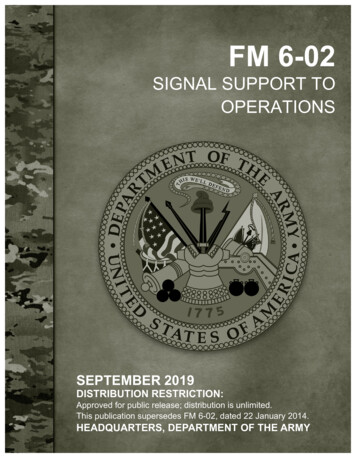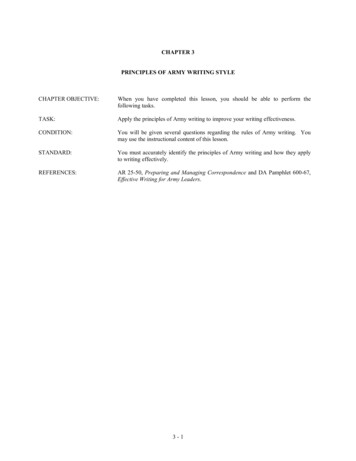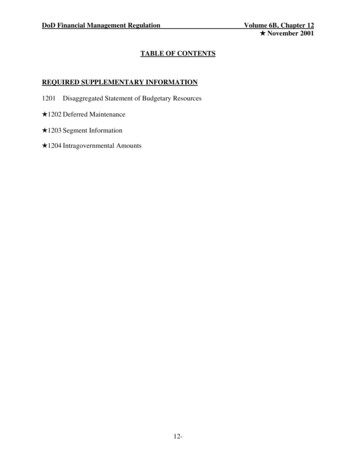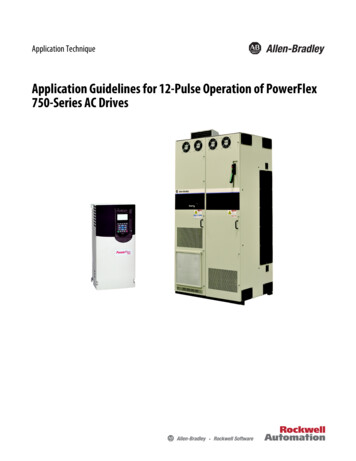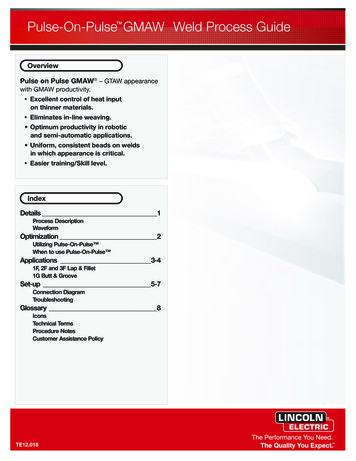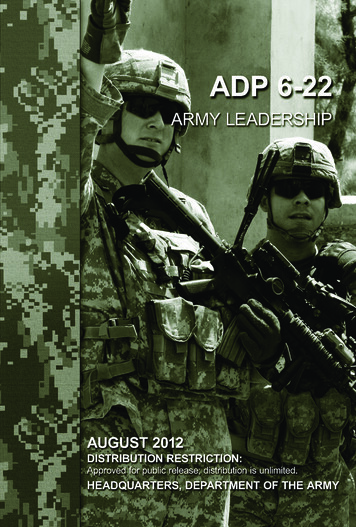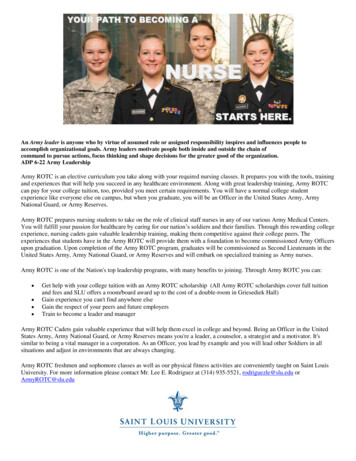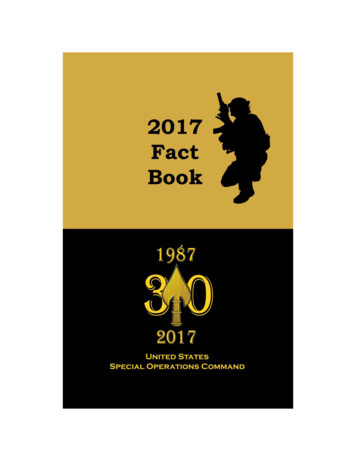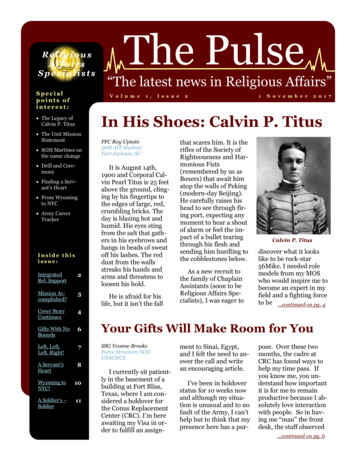
Transcription
ReligiousAffairsSpecialistsSpecialpoints ofinterest:The Pulse“The latest news in Religious Affairs”V o l u m e1 ,I s s u e21N o v e m b e r2 0 1 7In His Shoes: Calvin P. Titus The Legacy ofCalvin P. Titus The Unit MissionStatement SGM Martinez onthe name change Drill and Ceremony Finding a Servant’s Heart From Wyomingto NYC Army CareerTrackerInside thisissue:IntegratedRel. Support2Mission Accomplished?3Cover StoryContinues4Gifts With NoBounds6Left, Left,Left, Right!7A Servant’sHeart8Wyoming toNYC!10A Soldier’s –Soldier11PFC Roy Uptain56M AIT StudentFort Jackson, SCIt is August 14th,1900 and Corporal Calvin Pearl Titus is 25 feetabove the ground, clinging by his fingertips tothe edges of large, red,crumbling bricks. Theday is blazing hot andhumid. His eyes stingfrom the salt that gathers in his eyebrows andhangs in beads of sweatoff his lashes. The reddust from the wallsstreaks his hands andarms and threatens toloosen his hold.He is afraid for hislife, but it isn’t the fallthat scares him. It is therifles of the Society ofRighteousness and Harmonious Fists(remembered by us asBoxers) that await himatop the walls of Peking(modern-day Beijing).He carefully raises hishead to see through firing port, expecting anymoment to hear a shoutof alarm or feel the impact of a bullet tearingthrough his flesh andsending him hurdling tothe cobblestones below.As a new recruit tothe family of ChaplainAssistants (soon to beReligious Affairs Specialists), I was eager toCalvin P. Titusdiscover what it lookslike to be rock-star56Mike. I needed rolemodels from my MOSwho would inspire me tobecome an expert in myfield and a fighting forceto be .continued on pg. 4Your Gifts Will Make Room for YouSSG Yvonne BrooksForce Structure NCOUSACHCSI currently sit patiently in the basement of abuilding at Fort Bliss,Texas, where I am considered a holdover forthe Conus ReplacementCenter (CRC). I’m hereawaiting my Visa in order to fulfill an assign-ment to Sinai, Egypt,and I felt the need to answer the call and writean encouraging article.I’ve been in holdoverstatus for 10 weeks nowand although my situation is unusual and to nofault of the Army, I can’thelp but to think that mypresence here has a pur-pose. Over these twomonths, the cadre atCRC has found ways tohelp my time pass. Ifyou know me, you understand how importantit is for me to remainproductive because I absolutely love interactionwith people. So in having me “man” the frontdesk, the staff observed.continued on pg. 6
Page 2Integrated Religious SupportSGM Ralph MartinezRegimental SGMHQDA, OCCHOn 1 October 2017,“IexpectReligious AffairsSpecialists to befullyintegratedwithin your unit ofassignment at alllevels of command.The mission is stillthe same: providem e a n i n g f u lreligious supportto Soldiers, Familymembers,anda u t h o r i z e dcivilians.”our Military Occupational Specialty title officially changed to Religious Affairs Specialist.With this name change,our roles, and functionsin providing religioussupport didn’t change,we will always assist ourChaplains to ensure ourSoldiers have the opportunity of free exercise ofreligion. As we moveforward with our newtitle, we now must uniteour current core capabilities of religious operations, spiritual fitness,and basic human interaction tasks with additional functions and re-sponsibilities.As I stated in the firstedition of the Pulse, Iexpect Religious AffairsSpecialists to be fullyintegrated within yourunit of assignment at alllevels of command. Themission is still the same:provide meaningful religious support to Soldiers, Family members,and authorized civilians.Chaplains and ReligiousAffairs Specialists remain at the heart of Soldier resiliency and ArmyFamily resiliency. TheReligious Affairs Specialist is expected to integrate the Unit MinistryTeam (UMT) into theunit mission and movewith the chaplainthroughout the respective area of operations.Under the direction ofthe chaplain, the Religious Affairs Specialistwill coordinate and synchronize religious support for their unit.Chaplains and ReligiousAffairs Specialists mustbe responsive and adaptable to the challenges ofworking in a complexoperational environmentwhere chaplain sectionsand UMTs must plan,prepare, execute, andintegrate religious support throughout all levelsof war. The integrationof UMTs or ChaplainSections will continue tosustain programs that.continued on pg. 3Chaplain Corps Leadership-SGM MartinezChaplain, Major GeneralChaplain, Brig. GeneralSergeant MajorPaul K. HurleyThomas L. SolhjemRalph M. MartinezU.S. ArmyDeputy,Chaplain CorpsChief of ChaplainsRegimental Sergeant MajorChief of ChaplainsThe Pulse“The latest news in Religious Affairs”Return to Cover
Volume 1, Issue 2Page 3Integrated Religious Supportwill nurture ethical decisionmaking and facilitate religious formation and spiritual developmentas an inseparable part of their unitreadiness.Finally, you must successfullyexecute Religious Support Operations (RSO). UMTs must be fullyintegrated into the operationsprocess. A well-organizedplan will identify potentialproblems that may impedethe delivery of religious support, anticipate key eventsand assit in adapting tochanging circumstances. It isour fundamental task to effec-(continued from pg. 2)tively coordinate religious support tosustain spiritual readiness within ourtask organization. Therefore, theUMTs must integrate and prioritizetheir efforts by directing and synchronizing RSOs within their command. NCOs, I charge you withtraining and maintaining this visionthroughout the Chaplain Corps.Can the Mission be Accomplished?SFC Dustin HallSenior Career Management NCOUSACHCSSpecialist, is to be an organizational thinker. Analyze the unitmission and provide recomEvery organization in the Armymendations that can help toprides itself on developing a goodimprove the culture of themission statement. Often timesteam. There is often the ideamission statements involve corethat a Commander writes thevalues and competencies thatmission statement and then themake the organization stand out.organization is incapable ofWhile there is a great deal ofadapting it until the next Compride in these banners that a unitmander arrives (which can beaspires to accomplish, there oftenyears). This thinking is false.lacks one critical element that canThis thinking is detrimental tobe the determining factor indeveloping a learning organizawhether or not personnel will raltion where there is shared unly behind it. Namely, is the misderstanding and collaborativesion (really big goal) achievable? Oreffort.Picture a unit with a quarterlyphrase that will echo as a truthis the mission stated as a nebulousmission.Where a Commanderthroughout eternity. It’s reallyand continual process with no end?stands before the unit and gives thesomething different entirely,Does it contain language that allowsit’s more of a vision. While on unit something that can be accomthe unit to aspire to its completion?plished measurably within the quarface value there is substance,ter. The unit now has an achievableA mission statement that is tooin reality, it’s a never-endinggoal to rally behind, and the Comvague cannot be accomplished and mission that will likely be putmander has something to gauge thecan hurt an organization more than on a back burner by drivenunit’s success. Afterwards, the nexthelp it. Soldiers and DA Civilians,employees who want to helpfour month goal can be declared.regardless of the crafty words, willthe organization succeed inhave a near-impossible time supmeasureable ways. EmployBe value added to the unit by notporting something that they cannot ees, by human nature, want to only working within the confines ofsee an end to. It might even causeachieve, improve, and grow.the current mission, but instead be athe employees to become lost about To do so, they need an incencritical thinker who helps evaluatethe unit’s purpose. For example, iftive that can be completed, not and revise the mission altogether.you told a group of Soldiers thatjust a catchy phrase.Commanders will always appreciate“our mission is to live the Army ValThe challenge, regardless of staff officers and enlisted membersues each day at work,” then you’veposition as a Religious Affairs who possess organizational focus.basically only given them a catch-Return to Cover
Page 4Calvin P. Titus: A Role Model (continued from pg. 1)“Calvin PearlTitus ts,yourhabitsproduce yourcharacter ,andyourcharacterformsyourlegacy”The Order of TitusMedallion: givento Observer/CoachTrainers who successfully completea tour of duty andare nominatedthrough Commandchannels.reckoned with. My search for inspiration began at the Chaplain’s Museum at Ft. Jackson.While being led from one exhibitto another, I learned about thoseheroic chaplains and chaplains assistants who saved soldiers from sinking ships, fed soldiers caught in Japanese prisoner camps, risked theirlives to provide spiritual support tothe front lines, and so much more.But I never felt that swelling of theheart, that tear of admiration in thecorner of the eye, that thirst to knowevery detail of the story that comeswhen you meet your next personalhero.Then one day I was waiting in thehallway of the Chaplain's schoolwhen a plaque on the wall caught myeye. It told the story of how CorporalCalvin Titus received the Medal ofHonor for helping to capture the cityof Peking and end the Boxer rebellion.During the battle for control ofPeking, Corporal Titus demonstrated a profound sense of physicalcourage. ARDP 6-22, the Army’sguide to leadership, states, “Personalcourage is not the absence of fear. Itis the ability to put fear aside and dowhat is necessary” (2012, 3-3). Corporal Titus was willing to stare deathin the eye for the sake of a missionthat he knew would destroy forces ofevil oppression and bring liberty tothe people of China.It is one thing to know the rightthing to do. It is another thing to actswiftly on that knowledge when thatmoment of crisis comes. CorporalTitus knew it was right to put his lifeon the line to beat the Boxers and heacted on that resolve with swift determination.The Pulse“The latest news in Religious Affairs”At times I wonder whether or not Iwill act with courage when that crisiscomes knocking at my door. But, inthose moments of reflection, I am comforted by the words of another Medal ofHonor recipient-- Brigadier GeneralLawrence Chamberlain, who wrote inhis memoirs, “We know not of the future, and cannot plan for it much. Butwe can hold our spirits and our bodiesso pure and high, we may cherish suchthoughts and such ideals, and dreamsuch dreams of lofty purpose, that wecan determine and know what mannerof men we will be whenever and wherever the hour strikes that calls to nobleaction No man becomes suddenly different from his habit and cherishedthought.”This quote reminds me that choosingto follow in the tracks of heroic menhelps me “dream dreams of lofty purpose.” I too want to fight for the causeof freedom and justice. I too want toprotect the weak from the abuse of power. I too want to destroy those who usefear and intimidation to gain power.By examining the story of their lives,I get to see what it is like to live out theArmy Values day after day and for alifetime. I learn from them how to be acitizen and Soldier of honor.Later that week I researched Corporal Titus again and read about hisyears of service--how he completedseminary in order to be a chaplain onlyto be told by the Army that they didn'trecognize his denomination, how hereenlisted anyway as a chaplain assistant so he could go on serving the Soldiers he cared so much about, and howhe ended his career as a LieutenantColonel teaching officers for the ArmyReserve.Throughout his career Lieutenant.continued on next pageReturn to Cover
Volume 1, Issue 2Page 5Colonel Titus demonstrated a profound heart ofselfless service. To him, it wasn’t a rule he forcedhimself to live by; it was a sincere conviction inspired by his religious faith.For me the hardest thing about the Army Values is getting them from my head to my heart. Iam still learning the lesson that it is not enoughto adhere to the Army Values out of some pragmatic desire to advance my career or “be a betterperson.” While these goals may inspire some, Ineeded something more--something deeper.Over the past 10 weeks of BCT and 5 weeks ofAIT, I have come to the conviction that they ArmyValues are the result of the transcendent truththat orders our world. It is my belief in the creator God of the Bible that helped me realize thatthe Army Values enable me, as it enabled CalvinTitus, to “love God and love my neighbor” ineveryday life.To me, Lieutenant Colonel Calvin Pearl Titusembodies the principle that your desires determine your actions, your actions produce yourhabits, your habits produce your character, andyour character forms your legacy. He has a legacy of faithful, honorable service to his country,and that, even more than his heroics at Peking,makes him worthy of the Medal of Honor and ofour admiration and emulation.Image retrieved 25 SEP 2017 from chinarhyming.comReturn to Cover
Page 6Gifts with No Bounds (continued from pg. 1)my energy with those deployingthrough this center. What a difference a warm smile can make, especially considering the seriousnessof the challenges that lay ahead.Quickly, they trained me to helpfacilitate welcome briefings, assistthe cadre with issuing equipmentand they granted me privilegesneeded to carry out tasks that assist with validating those deploying.In the midst of these activities, Ifind myself having more and morecontact with deploying personnel,including a few members of ourCorps. On several occasions I’vepulled from my Master ResiliencyTrainer skills to ease the frustrations of civilian employees who arepending waivers. One evening Iremember speaking with a DODcivilian as she was having troublesleeping, worrying about the upcoming HEAT/MET (vehicle rollover) training. Her anxiety began tosubside as I showed her a shortrollover clip and reassured her thatshe would be fine. She was grateful forthe time that I spent with her, I wasthankful to be in the position to help.Even though I am not the assignedReligious Affairs Specialist at CRC, myministry through reassurance, optimism and genuine assistance is a dailycall.What Religious Affairs Specialistsdo is needed everywhere. One of ourSGMs (now retired) once told me,“Don’t ever allow anyone or any situation to dim your light”. In a situationsuch as this, I could sit in my room orgo to the PX in a dreary routine, but Ielect to be an encouragement to others. Remember when I said that Iwork out of a basement? Well there issome symbolism to my location.When I leave my temporary workstation at close of business, I walk upthe stairs and out into the sunshine,content in the fact that God has andalways will take care of me. He showsme that my gifts and training as a 56Mwill always make room for me.How to Make a Change: Write“Often times sadly,thegoodideasrarely make it pastaconversationbecause they aremissingonecritical element: avessel to travel”The Pulse StaffUSACHCSIf you’ve never heard a Soldierdiscuss ways that the Army couldbe better, “if this” or “if that,”then just wait ten seconds andyou will. This isn’t new or uniqueto the Army. In fact, many companies in the civilian workforceexperience this as well. The reason is simple: the Army has someof the brightest minds in theworld and they don’t like to settlewhen something can be donebetter. Often times sadly, thegood ideas rarely make it past aconversation because they areThe Pulse“The latest news in Religious Affairs”missing one critical element: a vessel to travel.A good idea or story without away to reach people is equivalentto spraying air freshener in yourhouse and expecting the entireState to smell better. The Pulse isthe vessel that can take your ideasand stories, or best practices, andensure the Army knows aboutthem.If you want to change your unit,the Chaplain Corps, or even theArmy—you must practice the art ofwriting. We’re looking forward toyour submission!Return to Cover
Volume 1, Issue 2Page 7Bring Back Drill and CeremonySFC Timothy SeppalaSenior Career Management NCOUSACHCSformation instep with thesound of cadence beingcalled at 120steps per minute.PLATOON, ATTENTION!RIGHT, FACE!FORWARD, MARCH!Those commands were commonplace in the Army in the days priorto the persistent conflict in whichwe have found ourselves over thepast sixteen years. Unfortunately,since the beginning of America’slongest war, drill and ceremony hasserved in a diminished role in thelives of today’s Soldiers. After basictraining, many of today’s Soldiersand Leaders do not conduct anymarching maneuvers until they attend NCOES schools. This is a travesty. Drill and ceremony is an essential component to instillingpride and discipline in Soldiers andin developing a Leader’s ability tolead with confidence. It is duringdrill and ceremony that Soldierslearn to respond instantly to aLeader’s command. It is duringdrill and ceremony that Leaderslearn to use their “command voice”and make decisions on the spot asthey move their unit from one placeto another, all the while keeping theIf you ask aleader whatthey thinkabout today’sSoldiers,many of themwill say thatthey areChaplain School and Fort Jackson Joint Color Guardsmart, butsections. As the leaders and Solthat they lack discipline. Idiers become more confident inagree, but the very thing thattheir ability, they will begin tomany leaders bemoan aboutthe Soldiers they lead is directly take pride in their accomplishments and in their organization.the fault of the leaders themselves. It is not hard to conductLeaders become better leaddrill and ceremony, in fact it isers, and Soldiers become betterone of the easiest trainingSoldiers when they learn toevents that a leader can conmarch together as a unit. Genduct with their Soldiers. Alleral Washington knew this,you need is at least three Solwhich is why he brought in thediers and a patch of ground and Prussian Baron Friedrich Vonyou can conduct team-levelSteuben to train the Continentaldrill and ceremony. This alsoArmy. It is time we get back toworks for an excellent teamour roots and back on the paradebuilding event for squads andfield!The AIT “56 M c”: What quality is most importantfor a Religious Affairs Specialist?SPC PrestonKaty, TXPV1 HarrisSuffolk, VA“I believe Religious Af- “Motivation—to alwaysfairs Specialists need to be ready to help othbe open-minded.”ers.”PV2 ShoemakerYork, PA“Religious Affairs Specialists need to beready for anything.”PV1 RobinsonBrigham City, UT“Religious Affairs Specialists must be kindand caring.”Return to Cover
Page 8Finding Your Servant’s HeartSGM Michael I. BairChief Career Management NCOHQDA, OCCH“If you findy o u r s e l ftryingtod e f i n ere li gi o u ssupport, looknofurtherthan doctrinefound in FM 10 5a n dadministrativeguidanceinAR 165-1.”As we transition into our new MOStitle, it is important that we don’t forget the three 56M core capabilities;integrate religious operations, spiritual fitness, and basic human interaction tasks and the mission of theChaplain Corps as stated in FM 1-05(Religious Support, October 5, 2012),“to provide religious support to theArmy across unified land operationsby assisting the commander in providing for the free exercise of religion andproviding religious, moral, and ethicalleadership.” AR 165-1 (Army Chaplain Corps Activities, June 23, 2015)repeatedly talks about the ReligiousAffairs Specialist’s role in providingexpertise in religious support and thecommander’s religious support operations. The part that we must neverforget is that we are supporting thecommander “in responding to theneeds of Soldiers, Family members,and other authorized personnel.”If you find yourself trying to definereligious support, look no further thandoctrine found in FM 1-05 and administrative guidance in AR 165-1. FM 105 lists the Religious Support CoreCompetencies as Nuture the Living,Care for the Wounded, and Honor theFallen and provides a partial list ofReligious Support Functions as: Advising the command on religion, morals, morale, and ethicalissuesLeadership of religious worshipAdministration of religious rites,sacraments, and ordinancesProvision of pastoral care andcounselingTeaching and management of religious educationFamily-life ministry (division/expeditionary support commandThe Pulse“The latest news in Religious Affairs” (ESC))Provision of professional support tothe command and staffManagement and administration ofpersonnel, facilities, and funds necessary to the religious support missionLiaison with local or host-nation religious leaders as directed by thecommanderConduct of religious support planning, training, and operationsAR 165-1 states, “Religious supportincludes providing essential elements ofreligion to include worship, religiousrites, sacraments and ordinances, holydays and observances, pastoral care andcounseling, and religious education.”Religious Affairs Specialists have a primary or supporting role in each of theCompetencies, Religious Support Functions, and Essential Elements of Religion. Sometimes, we even find ourselves working independently of thechaplain in this support role. It’s alsoimportant to remember, “the chaplaindetermines UMT priority of effort anddecides when simultaneous, independent operations are necessary as an exception.”We are in the people business. Someof the tasks we are asked to complete,such as providing external advisementto a commander may tempt us to feelmore conspicuous as valued members ofthe unit, but these are only one part ofour tasks. Again, we are in the peoplebusiness. I submit that you must haveat your core a servant’s heart. Some ofthe Religious Support tasks we are askedto complete can become old and dull police calls around the chapel, setting uprefreshments, counting the offering,managing the chaplain’s calendar, organizing the religious texts in the pews,managing the registration for events,.continued on next pageReturn to Cover
Volume 1, Issue 2Page 9A Servant’s Heart(continue from page 8)etc. However, if you know who you are and whyyou serve, no task in support of the Soldiers andFamily members is truly dull.Take time to hone your basic human interaction tasks. You may be an extreme introvert, butin order to be successful you must learn to exercise some extraverted tendencies and make yourself available to Soldiers. You have to put yourself out there by participating in typical everydaySoldering tasks. Showing up for PRT, participating in road marches, conducting motor stables,attending CSM/1SG meetings, writing SOPs andhoning your Warrior Skills are part of being agood Soldier. Soldiers respond best to other Soldiers. If you want to feel like a valued member ofthe unit, act like a valued member of the unit.All of these activities are your opportunity tosupport the Commander in responding to needsof the Soldiers.Our name may have changed, but our missionremains the same. Take time to evaluate who youare are you a servant at heart? Are you willingto do what needs to be done to integrate religiousoperations, spiritual fitness, and basic humaninteraction tasks? If so, this is the job for you!There is no better job in the Army than directlysupporting the First Amendment of the U.S.Constitution. Take pride in what you do andnever forget that you are a valued member of theU.S. Army and the Chaplain Corps. Pro Deo etPatria.Be the first to send the solution todustin.m.hall2.mil@mail.mil to win!56 Mike Spotlight: Initial Military Training NCOICBorn in Pikensville, Alabama,SFC Tamara Hornbaker entered theArmy in 2003. She currently serves as the Senior Initial MilitaryTraining (IMT) NCOand is responsible forthe successful management of both the Chaplain Officer Basic Leader Course for new Chaplains, as well as the Advanced Individual Training coursefor Religious Affairs Specialists.During her time in IMT, SFCHornbaker has lead the ChaplainSchool in the transitional titlechange of 56Ms, and has beena leader on many of the initiatives inherent in that change.SFC Hornbaker has manageda curriculum overhaul and hashelped to better-define what itmeans to be a Religious Affairs Specialist. For her hardwork and impact to the Chaplain Corps, The Pulse salutes you withthis coin SFC Hornbaker!Return to Cover
Page 10A “Wyoming Boy” Stationed in NYCSSG Chris PatchenGarrison Chaplain NCOICUSAG, Fort Hamilton, NY“.along withn o r m a loperations ofconductingre li gi o u ss u p p o r tactivities,l e a d i n gSoldiersandsupportingG a r r i s o nfunctions andevents lead tobusyweeksand months.”A minute is defined as 60 seconds,unless it is a New York Minute (NYM).The late Johnny Carson defined a NYMas “the interval between a Manhattantraffic light turning green and the guybehind you honking his horn.” So whatcan you do in a NYM?For starters, you can drive 8 miles in75 minutes or you can run along the water for 2 miles and watch the sun rise onthe Statue of Liberty and One WorldTrade Center. In order to play hard, youhave to work hard. Having to wear more“hats” than there are days in the weekhelps ward off that nasty “clean desk”syndrome. From Chaplaincy ResourceManagement to driving for the Secretaryof Defense. From being the Master ofCeremonies for ceremonies and observances to providing Area Coverage for 8million people who speak over 200 languages with over 100 distinctive faithgroups. From leading a parade to observing and controlling a full scale exercise. All of the above, along with normaloperations of conducting religious support activities, leading Soldiers and supporting Garrison functions and eventslead to busy weeks and months.With hard work complete, it is time toplay hard. What is your “poison?”Sports? Cheer your voice away. With 10local professional organizations, community sports leagues and a healthy Army Intramural Sports program, there isalways a chance to “root, root, root forthe home team.” Does the stage andspotlight make you giddy? There isBroadway, Off-Broadway, Off-OffBroadway and neighborhood actingtroupes all wanting you to watch. Musicyour thing? Classical, rock, country, hip-hop, electronic, and karaoke will fillyour ears from the big stage to your localdive bar to the subway stations. Are youThe Pulse“The latest news in Religious Affairs”a foodie? Every cuisine your palate canimagine is available; and most of the timeyou don’t even have to leave your house.You know a pie (pizza) joint is good whenthe New York Police Department is tripleparked, eating their slices off the hood oftheir patrol cars. Does volunteering andphilanthropy warm the cockles of yourheart? Each population demographic hasa non-profit organization. Every occasionfor play has the opportunity to volunteer.For me, the New York City Joint ColorGuard, Project Healing Waters Fly Fishingand the PGA Tour have kept me nice andtoasty. Suppose you are artistic and can’tfind inspiration or muse, then you maywant to conduct a self-assessment andthen begin to dream with open eyes.In a city that never sleeps, when doesone rest? Well, I will let you know when Ifigure it out; but most likely after I PCS.Many musicians have penned and sungabout New York City, from the BeastieBoys to George Gershwin; from TaylorSwift to the Ramones, from Jay-Z and Alicia Keys to Billy Joel. At the end of mytour here at Fort Hamilton, this boy fromWyoming, now adopted by New York City,will leave with the words of Frank Sinatraforever inscribed on my life: “If I canmake it here, I’ll make it anywhere. It’s upto you New York, New York.”Return to Cover
Volume 1, Issue 2The EnlistedSoldier’s—Soldier:SPC Josiah StoweBrigade Religious Affairs NCO2nd BCT, 101 ABN DIVThe Moral Compass of the Unit, the EnlistedSoldier’s Soldier, the friend. Religious Affairs Specialists have an obligation to be both the mostmorally upright Soldier and an obligation to be themost approachable Soldier. For myself, being inan infantry unit, performing both isn’t exactlyeasy. I cannot stand on the moral high ground if Iam drinking or partying every night with the Infantry, but I cannot truly be integrated into theunit if I am the buzzkill, constantly reminding mySoldiers that their favorite off-duty actions are inherently immoral. 56Ms are called to be a beaconof hope, happiness, and morality, but not so highas to be unreachable. And so we have to find a balance.Oddly enough, I have found that balance in“Ministry of Presence”. I will go where my Soldiersgo (with a few exceptions). But while I go wherethey go, I do not necessarily do what they do. I willkeep my morality intact, regardless of the situation I am placed in. The darkest places are in mostneed of a light. For example, if a group of my Soldiers are going to a party, I might go with them as their designated driver. I’ve found that my enlisted Soldiers are more willing to talk to me thanthe Chaplain, even more so when they’ve had a fewdrinks. This gives me the unique opportunity toidentify more at-risk Soldiers, and allows me tobetter steer them toward the help they need.I also understand that resisting temptation maybe more difficult for some, and I would suggestusing wisdom when deciding where you will go, orif you should go at all, always keeping in mind thetemptation you might be exposed to. In our line ofwork, reputation is everything, and a 56M with abad reputation can be a hindrance to the ChaplainCorps mission.Page 11I Want YouTo Help PPO!The Personnel Proponent Office (PPO) is onthe front-lines, in the trenches, of change andthey are fighting for a better tomorrow foryou! I want YOU to pick up a pen and paperand support the effort. Send them your ideasto improve our MOS. Be a voice of changeand help keep their efforts moving forward.Pro Deo Et Patria!Send your innovative ideas to:SFC Timothy Seppelatimothy.f.seppala.mil@mail.milReturn to Cover
“ACT NOW”: It’s Your
building at Fort Bliss, Texas, where I am con-sidered a holdover for the Conus Replacement Center (CRC). I'm here awaiting my Visa in or-der to fulfill an assign-ment to Sinai, Egypt, and I felt the need to an-swer the call and write an encouraging article. I've been in holdover status for 10 weeks now and although my situa-



